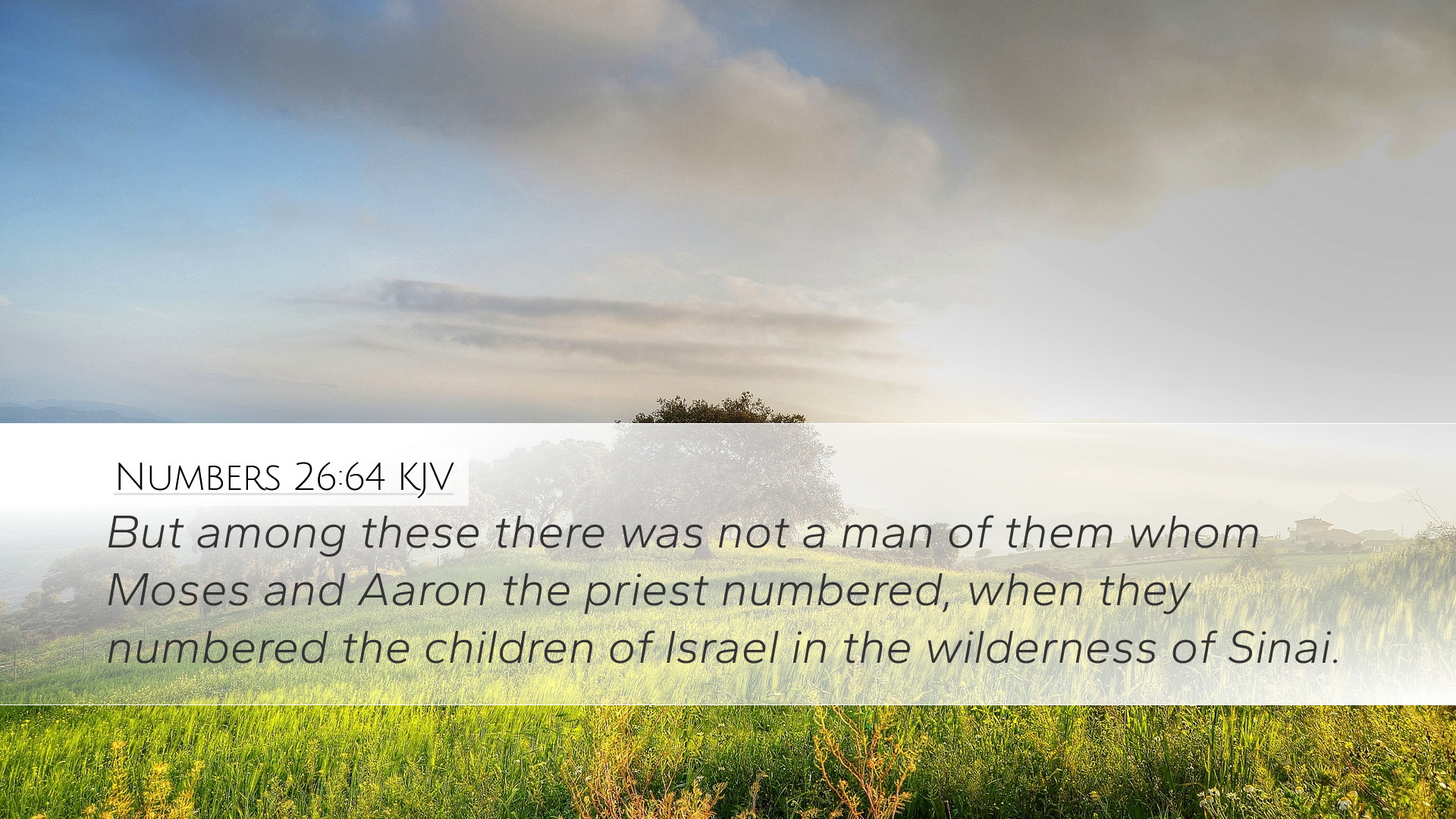Commentary on Numbers 26:64
Numbers 26:64 states: "But among these there was not a man of those that were numbered by Moses and Aaron the priest, when they numbered the children of Israel in the wilderness of Sinai."
This verse encapsulates a significant moment in Israel's history, marking a transition from the older generation to the new while highlighting God's faithfulness and the consequences of rebellion.
Contextual Background
This verse occurs within the broader narrative of the Book of Numbers, which documents the Israelites' journey in the wilderness.
The numbering of the Israelites serves to both record their population and prepare for the conquest of Canaan.
The first census occurred in Numbers 1, while this subsequent census takes place after the death of the wilderness generation, underscoring a new beginning.
Insights from Public Domain Commentators
Matthew Henry's Commentary
Matthew Henry focuses on the implications of this passage within the theme of God's judgment and mercy.
He observes that the context of this verse is the fulfillment of God’s Word against the previous generation, which was condemned for their disobedience and lack of faith.
According to Henry, this verse demonstrates that the former generation, which had been counted at Sinai, has died out, with the exception of Joshua and Caleb who remained faithful to God.
-
Judgment and Mercy: Henry emphasizes that the absence of the numbered men symbolizes the judgment upon those who rebelled against God.
Yet, it also highlights God's mercy toward the new generation, giving them an opportunity to serve Him.
-
Continuity of God's Promises: The commentary reflects on the continuity of God’s promises despite human failure.
Only the two faithful spies, Joshua and Caleb, are acknowledged as exceptions, signifying hope for the future.
Albert Barnes' Notes
Albert Barnes elaborates on the significance of the numbering process and notes the complete transition of leadership within Israel.
His commentary reflects on the changing demographics of the people, as those counted during the first census have all perished due to their unbelief.
-
New Generation: Barnes highlights that the new generation signifies a fresh start for Israel, pointing to the importance of leadership and faithfulness in guiding God's people moving forward.
-
Historical Reflection: The absence of the previous generation serves as a critical reminder of the consequences of unfaithfulness.
It illustrates God's righteous judgement while presenting an opportunity for the new generation to rise in faith.
Adam Clarke's Commentary
Adam Clarke provides a detailed analysis of the verses surrounding Numbers 26:64, offering insights into the cultural and ritualistic aspects of Israel’s census.
Clarke emphasizes the deliberate nature of the counting process and what it signifies for the community as a whole, reflecting on the unity that God desires among His people.
-
Census as a Divine Order: Clarke notes that the census is not merely a numerical tally but a divinely instituted order, aiming to instill a sense of accountability and identity among the Israelites.
-
Faith and Obedience: He draws attention to the remnants of the faithful, asserting that even in judgment, God preserves a faithful remnant, which serves to encourage the new generation to trust in God’s promises.
Theological Implications
The implications of Numbers 26:64 stretch beyond a mere historical recount; it beckons theological reflection on issues such as judgment, grace, and the faithfulness of God.
-
Divine Judgment: The verse embodies a stark reminder of the seriousness of sin and rebellion against God.
The punishment of the earlier generation serves as a warning to subsequent generations about the importance of faithfulness and obedience.
-
God’s Faithfulness: Despite the rebellion and the death of those who doubted, God remains faithful to His covenant.
The transition to a new generation conveys hope and continuity in God’s redemptive plan.
-
New Beginnings: For pastors and leaders, the text reinforces the concept of new beginnings with God. It signals that amidst judgment, there lies potential for renewal and restoration for those who believe.
Application for Today
As we reflect on Numbers 26:64, it challenges us to consider our own faithfulness to God and His call on our lives.
The lessons from the Israelites’ journey are still relevant for contemporary believers and church leaders.
-
Accountability: It invites individuals and church communities to be accountable for their spiritual journeys, recognizing the importance of obedience and faithfulness.
-
Faithfulness of the Remnant: In a world that often turns away from God, the concept of the remnant remains a powerful truth; we are called to be the faithful few who continue to trust in God’s promises.
-
Hope in Transition: As churches evaluate leadership and direction, this passage encourages a hopeful outlook on transition, reminding us that God can raise up new leaders equipped for His work.
Conclusion
Numbers 26:64 serves as a poignant reminder of God's judgment and grace, encapsulating the transformation within Israel’s community.
As theologians and pastoral leaders, it encourages us to examine our lives in light of biblical truth while remaining anchored in the faithfulness of God who calls us to a new generation of purpose and mission.
Through careful reflection on this verse, one can glean valuable insights that have application in preaching, teaching, and personal spiritual growth.


